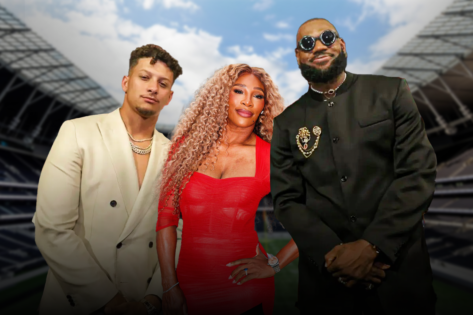American pro sports are hitting a turning point faster than a playoff buzzer-beater, and the power dynamic is flipping upside down. With jaw-dropping player salaries, equity stakes, media empires, and investment portfolios, top athletes are evolving from mere employees into full-blown business moguls. In some cases, they’re raking in more money or wielding more influence than the owners who sign their paychecks. It’s a seismic shift that’s got the sports world buzzing, and a recent LinkedIn post by Andrew Petcash only fanned the flames.
He wrote, “$72m. Soon to be over $100m. It’s wild the salaries athletes are now pulling…but even crazier is what these contracts will look like in another decade. The first $1B athlete contract is on the horizon. They’ll soon be making more than the owners of the teams they play for. Then what?”
Paired with a striking image of a paycheck towering over a stadium, his post hints at a future where players call the shots. The numbers and trends support this, painting a picture of athletes surpassing their bosses in wealth and influence.
Athletes’ Salaries Are Surpassing Owner Buy-In Prices
The paycheck game has reached new heights. That means LeBron’s personal earnings exceed what some owners paid to enter the game. With $1 billion contracts on the horizon, players are flipping the traditional financial hierarchy. That figure—detailed by Forbes—highlights a financial empire built through both on-court dominance and off-court savvy.
Now compare that to what some NBA owners paid for their teams:
Mark Cuban bought the Dallas Mavericks for $285 million in 2000.
Robert Sarver acquired the Phoenix Suns for $401 million in 2004.
According to Forbes’ 2024 valuations:
The Mavericks are now worth over $4 billion.
The Suns are valued at $3.5 billion as of 2024.
This means LeBron’s individual earnings dwarf what some owners paid to enter the game, a trend that’s becoming more common as athlete salaries soar. With contracts like the projected $1 billion deals on the horizon, players are outpacing the initial investments of team owners, flipping the traditional financial hierarchy.
Ownership Stakes & Equity Moves Are Redefining Power
Athletes aren’t just cashing checks—they’re buying into the game.
LeBron James holds a stake in the Boston Red Sox via Fenway Sports Group.
Kevin Durant owns equity in the Philadelphia Union (MLS) and is deeply invested in startups through his firm.
Naomi Osaka is tapping emerging markets, with stakes in pickleball and women’s soccer.
Patrick Mahomes owns pieces of the Kansas City Royals and Sporting KC, blending NFL stardom with local sports ownership.
Front Office Sports reports that today’s athletes are securing ownership while still active, using their influence and earnings to challenge the old guard. This marks a redefinition of power—athletes aren’t just players; they’re stakeholders.
The Rise of Athlete-Driven Media Empires
The media landscape is where athletes are truly flexing their muscles.
SpringHill Company, co-founded by LeBron, is valued at $725M+ and backed by Nike, RedBird, and Epic Games.
Tom Brady’s 199 Productions, and the Kelce brothers’ partnership with Wave Sports + Entertainment are turning podcasts and docuseries into money-makers.
Draymond Green, J.J. Redick, and Paul George are growing their relevance through original shows and commentary.
Athletes now own the platform, not just appear on it. They’re building content ecosystems, connecting directly with fans, and generating independent revenue streams. This media power adds another layer of leverage—making them magnets for both audiences and sponsors.
Athletes Are Building VC & Startup Portfolios
Venture capital is the new arena for athlete dominance.
Serena Ventures, Steph Curry’s SC30, and Kevin Durant’s 35V are investing in tech, fashion, and sports startups.
Their fame attracts deal flow, and their funds rival those of traditional VCs.
Even rising stars like Angel Reese and Caitlin Clark are landing early-stage equity via NIL deals, positioning them as investors before they even go pro. This trend is reshaping athlete capitalism, moving them from endorsers to early backers with real financial power.
Owners’ Wealth Is More Static Than You Think
While athletes innovate, many owners are rooted in traditional wealth: real estate, tech, or finance. Their net worths are often paper-heavy, relying on rising team valuations. Meanwhile, athletes earn liquid income via salaries, endorsements, and investments, and are global cultural icons.
Players like LeBron and Mahomes hold cultural and financial power that’s more dynamic than many of the owners they “work” for.
This growing gap in liquidity, influence, and branding hints at a future where athletes might not just be more famous, but more powerful.
Final Whistle: The Players Are Becoming the Bosses
While athletes innovate, many team owners remain rooted in traditional wealth. They’re often real estate tycoons, tech moguls, or finance veterans, their fortunes tied to team valuations or market trends rather than dynamic brand-building. Forbes’ franchise valuations show owners’ wealth is often paper-heavy, reliant on rising team worths like the $4 billion Mavericks or $3.5 billion Suns, rather than liquid earnings. Players, by contrast, earn cash in real time through salaries, endorsements, and investments, gaining cultural leverage as global faces. Owners might control the franchises, but athletes drive the audience. LeBron’s billion-dollar haul or Mahomes’ equity stakes outshine the static profiles of owners who aren’t often brand magnets. This gap highlights a growing divide, where players’ liquidity and influence could soon eclipse the ownership class.
The next era of sports may not be defined by who owns the team, but by who owns the audience. And increasingly, that’s the athlete. They run the game not just with their talent, but with their investments, companies, and media power. For the first time in modern history, the employee may be more powerful than the boss.
The post Who Really Runs the Game? Why American Athletes Might Soon Make More Than Their Team Owners appeared first on EssentiallySports.
